On Saturday night, WBA (Super), IBF and WBO heavyweight World champion Anthony Joshua returns to familiar territory at Wembley stadium to make his sixth title defence against WBA mandatory Alexander Povetkin.
The fight has been described invariably as ‘dangerous’ and a potential ‘banana skin’ by the defending champion and his promoter Eddie Hearn of Matchroom Boxing. They and Joshua’s supporters point to Povetkin’s pedigree as a former world champion and, like Joshua, one-time Olympic gold medallist with a stellar amateur career, his experience of fighting at world-class level for over a decade and his power which has gifted the heavyweight division a string of highlight reel knockouts in recent years.

Sky boxing pundit Johnny Nelson raised eyebrows when he recently described Povetkin as being a tougher opponent for Joshua than WBC champion Deontay Wilder, with whom high-profile talks for a super fight against Joshua in the UK broke down earlier this year, leaving a swathe of fans disappointed and both sides blaming each for the ultimately doomed negotiations. So where exactly does the truth lie and how competitive does a fight against Povetkin really figure to be?
The Russian’s professional boxing career can be roughly divided into two parts. The first of which, lasting from 2007 to 2013, began with him picking up a trio of three consecutive wins against decent opponents in Larry Donald, Chris Byrd and Eddie Chambers, elevating him to serious contender-status and also the mandatory challenger for the then heavyweight champion Wladimir Klitschko. It would take five years for Povetkin to finally step into the ring with the Ukrainian. With trainer Teddy Atlas at the helm, he faced a string of hopelessly outmatched opponents before receiving the opportunity to face Ruslan Chagaev in 2011 for the vacant WBA (Regular) heavyweight title after Klitschko was elevated to ‘Super Champion’ by the sanctioning body. Povetkin won and went on to successfully his title three times.
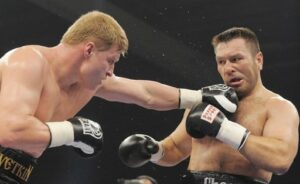
Sandwiched between easy wins against already-busted former prospect Cedric Boswell and faded former titleholder Hasim Rahman was a much tougher than expected battle with a moving-up-in-weight cruiserweight champion Marco Huck. The smaller man gave Povetkin hell, hurting him multiple times and leaving him barely able to stand by the fight’s conclusion. The outcome could have gone either way but it was Povetkin who eked by on a majority decision, doing little to convince the doubters that he would stand any chance if he entered the ring Klitschko. Nevertheless that is what finally happened on 5th October 2013. Fighting in front of a partisan crowd in Moscow, Povetkin was manhandled by Klitschko in a one-sided fight, suffering four knockdowns en route to ridiculously lopsided cards of 119-104 from all three judges for the visiting champion.
After such an emphatic and humiliating defeat, one could have been forgiven for assuming that we had seen the last of Povetkin as a serious force in the heavyweight division. Instead, he came back for the second part of his career with a vengeance, looking better than he ever had done. He won five straight fights against respectable foes in Manuel Charr, Carlos Takam, Mike Perez, Mariusz Wach and Johann Duhaupas, all inside the distance and in sickeningly violent fashion. All five men brought reputations for durability or had never before been stopped in such a conclusive manner. Povetkin, already thirty four years old at the time of the Klitschko defeat, was suddenly fighting like a man reborn. What could explain such a dramatic transformation?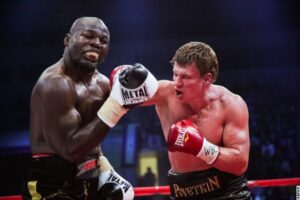
The answer may well lie in one of the ugliest episodes to have tainted the sport of boxing in recent years. In 2016, Povetkin was scheduled to face Wilder in a May showdown in Moscow, but tested positive for the performance-enhancing drug (PED) meldonium which increases exercise capacity in athletes. With the Wilder fight now off, the WBC ordered Povetkin to face former titleholder Bermane Stiverne in December for their interim version of the heavyweight title. Stiverne made it to Russia for the weigh-in and face-off but then, on the morning of the fight, received notification that Povetkin had once again tested positive for a banned substance, the muscle-builder ostarine. An incensed Stiverne headed back on a plane to Las Vegas, but Povetkin would still fight that evening.
Whether by luck or design – and one can be the judge of that – former world title challenger Duhaupas was ready to step in at the shortest of short notices. Duhaupas had taken a hellacious beating from Wilder the year before but demonstrated an incredible chin by never going down before the referee stopped the fight in the penultimate round. He had since rebounded with a massive knockout victory over Robert Helenius, taking the once highly-regarded Finn’s zero in the process. That night in Yekaterinburg, he was on the receiving end of one himself. A juiced-up Povetkin nailed him with a left hook that left him out cold on the canvas for the first time in his career. 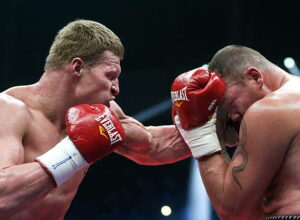
The outcome compounded the outrage of a high-profile fighter failing not one but two drugs tests in such a short space of time and in March 2017 the WBC took the unprecedented step of banning Povetkin indefinitely. However, within eight months, they had reversed their decision, seemingly accepting the protestations of Povetkin’s powerful promoter, Andrey Ryabinsky, that an innocently-taken contaminated supplement was to blame.
Meanwhile, Povetkin had returned to action, unaffected by the WBC ruling as it only applied to bouts sanctioned by them, coasting past Andriy Rudenko over the twelve-round distance but looking distinctly less machine-like than he had in his previous five fights. He also went the distance in his next fight against Christian Hammer, winning easily on points but never having a negative Hammer – previously stopped by Wach and Tyson Fury – in any real trouble. Considering that Rudenko and Hammer were a step-down from Charr, Takam, Perez, Wach and Duhaupas, it simply raises more questions over Povetkin’s string of stoppages and his return to more pedestrian form.
Povetkin was back with a bang in his next fight, knocking out the UK’s David Price with a devastating left hook on the undercard of Joshua’s title defence against Joseph Parker in Liverpool. He was however up against a heavyweight prone to defensive lapses and with questionable punch resistance. Moreover, the victory did not come without a scare, as a big left hand from Price badly hurt Povetkin near the end of the third sound, sending him tottering backwards towards the turnbuckle for the referee’s count as only the ropes held him up. Leading up to the left hand finisher in the fifth round, Povetkin was also breathing heavily and showing signs of fatigue in a throwback to the first part of his career when stamina issues plagued him.
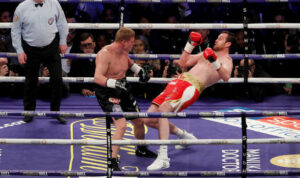 In his last three fights, Povetkin has looked more and more like his flawed 2007-2013 version. At thirty nine years of age and ruling out any bottle-derived assistance (Povetkin signed up to VADA, the Voluntary Anti-Doping Association for the Joshua fight), it is hard to see a return to the rampaging 2014-2016 version. It does not bode well for his chances against Joshua who enjoys significant height, reach and weight advantages as well as being the stronger, younger and fresher man. Joshua is also the bigger puncher and, unlike Price, is a proven finisher. Povetkin is tough but has been badly hurt by lesser punchers in the past.
In his last three fights, Povetkin has looked more and more like his flawed 2007-2013 version. At thirty nine years of age and ruling out any bottle-derived assistance (Povetkin signed up to VADA, the Voluntary Anti-Doping Association for the Joshua fight), it is hard to see a return to the rampaging 2014-2016 version. It does not bode well for his chances against Joshua who enjoys significant height, reach and weight advantages as well as being the stronger, younger and fresher man. Joshua is also the bigger puncher and, unlike Price, is a proven finisher. Povetkin is tough but has been badly hurt by lesser punchers in the past.

While Povetkin possesses far more cumulative experience, it is Joshua who boasts the superior resume as a professional. Victories over Klitschko and Joseph Parker far exceed Povetkin’s best win against Chagaev. It’s worth noting that Joshua, who is still a developing and improving fighter, was able to handle Takam, a fighter with a similar style and dimensions to Povetkin. Povetkin has fought fighters with similar dimensions to Joshua, but no-one remotely of the same calibre, with the exception of Klitschko who utterly dominated him. Povetkin is an accurate puncher and, juiced-up or not, has the power to hurt Joshua, but not the fleet-footedness, speed or size to make it count.
On Saturday night, Povetkin will get another big pay-day against arguably the world’s biggest boxing star today. It’s a luxury which is quite frankly undeserved given his record as a habitual PED-offender, a fact that has been largely brushed off by Joshua and his promotional team in the lead-up to the fight. In the wake of the failed Wilder negotiations and the subsequent announcement that Wilder would instead fight against comebacking lineal champion Fury later this year, the battle for credibility in the eyes of the boxing public is ongoing. Selling Povetkin as a credible alternative opponent is a must for team Joshua. It does not however make it truth. 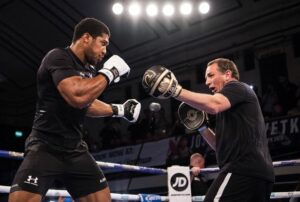
After going the twelve-round distance for the first time in his career against Parker the last time out, expect Joshua to get back in the stoppages column this Saturday. Don’t expect it to be particularly competitive either. Joshua demonstrated against Parker that he is becoming a more refined boxer and against a physically outmatched foe in Povetkin, he will be able to showcase the full extent of his arsenal.
The Joshua jab is becoming a weapon in its own right and he will use this to keep Povetkin at distance. Povetkin will try his best to get on the inside but will pay the price in the form of heavy return fire from Joshua. If Joshua can penetrate Povetkin’s tight guard and connect clean with his power punches, he could well end the fight there and then, but the more likely scenario is that he gradually breaks down his foe to a mid-rounds stoppage.
Article By Paul Lam
Follow Paul on Twitter at: @PaulTheWallLam